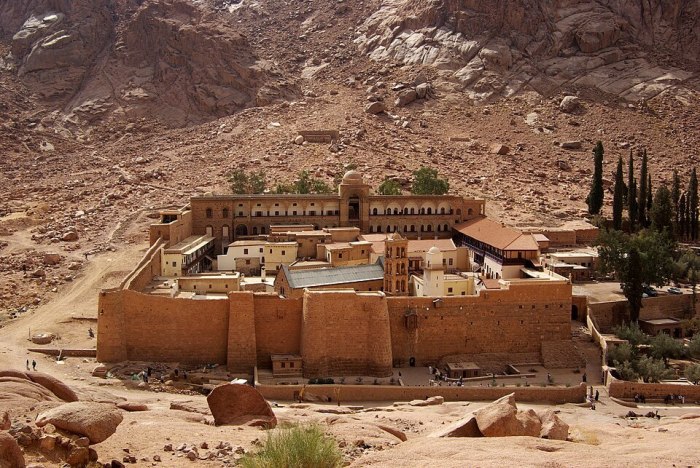
A ruling by an Egyptian court transferring ownership of one of the world’s oldest monasteries to the state has provoked global condemnation from Christian leaders and advocacy groups urging foreign governments to get involved.
This week, Greek Foreign Minister George Gerapetritis met with his Egyptian counterpart, Badr Abdelatty, in Cairo to discuss the recent ruling on Saint Catherine’s Monastery that sparked fears that the Greek Orthodox monastery at the foot of Mount Sinai will be shut down and converted into a museum, displacing the Orthodox monks who have lived there for centuries.
Mount Sinai, revered in Jewish, Christian and Islamic tradition, is believed to be where God spoke to Moses through the burning bush and where Moses received the Ten Commandments. The site has long been central to Christian theology and pilgrimage, and the monastery is considered one of the world’s oldest continuously functioning religious institutions.
Gerapetritis told the media that both sides agreed “to move forward on the basis of the monastery’s established traditions and enduring value as a place of Greek Orthodox worship.”
“We agreed in the immediate future to work towards safeguarding the rights of the monastery, as well as its legal status,” Gerapetritis said after the meeting, according to Reuters.
“Both Egypt and Greece intend to move forward based on the long-standing tradition and the already established status of an emblematic monastery for its Greek Orthodox character of worship.”
A statement from the office of President Abdel Fattah el-Sisi last week reiterated Egypt’s “full commitment to preserving the unique and sacred religious status of Saint Catherine’s Monastery and preventing its violation.” But concerns persist that the judicial ruling will override those pledges.
The court order directed that the land belonging to Saint Catherine’s Monastery, established between 548 and 565 by Byzantine Emperor Justinian I and recognized as a UNESCO World Heritage Site, be placed under Egyptian state ownership, The Telegraph reported.
Although the president gave public assurances that the monastery’s religious status would remain intact, Christian leaders have expressed alarm over the court’s decision and the lack of clarity about its implementation.
Archbishop Ierenemos II of Athens and All Greece rebuked the Egyptian court’s action.
“Following yesterday’s scandalous ruling, a violent infringement of human rights and, more specifically, of religious freedoms by Egypt’s judicial authorities, the world’s oldest Orthodox Christian monument, the Monastery of Mount Sinai, is entering a period of great trial — one that evokes memories of darker times in history,” he said in a statement.
He called on the Greek government to intervene immediately to ensure that the monastery is not “effectively abolished.”
The monastery’s library houses an extensive collection of ancient Christian manuscripts and Byzantine religious art, including mosaics and icons regarded as irreplaceable, according to the Telegraph.
There is mounting anxiety that any state-led conversion of the site into a museum would put these treasures and the monastery’s spiritual life at risk.
The court ruling represents a serious threat to Saint Catherine’s independence and historic rights, said a statement by In Defense of Christians, a U.S.-based advocacy group focused on protecting Christians and other religious minorities in the Middle East.
While Egyptian authorities have issued statements downplaying the impact of the ruling, the decision raises the possibility of increased state control over religious institutions and could serve as a precedent for similar actions elsewhere in the region.
IDC described the ruling as undermining the monastery’s legacy as a UNESCO World Heritage site and a center of Christian heritage.
“IDC stands with the faithful who worship and serve at Saint Catherine’s Monastery, and with our entire Greek Orthodox family.” IDC executive director Richard Ghazal said. “We call on the U.S. Government to exercise diplomatic influence to urge the Egyptian government to reverse this unjust ruling and to safeguard the rights of Christian communities in Egypt.”


















